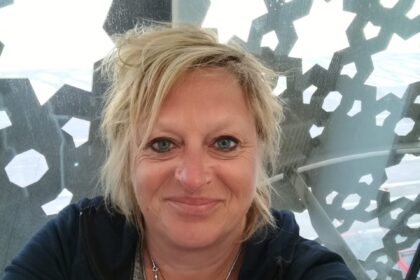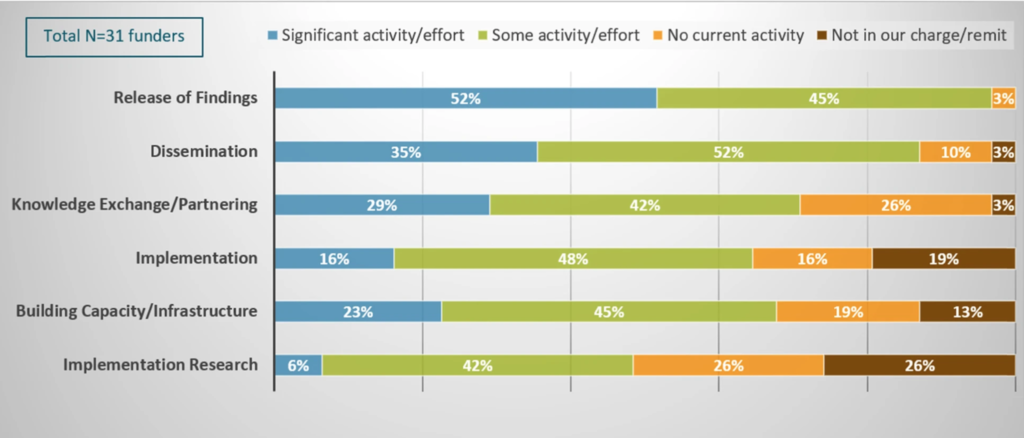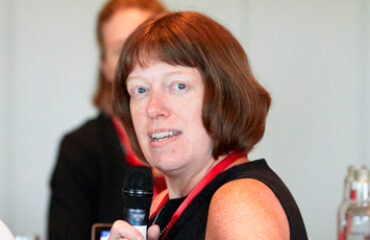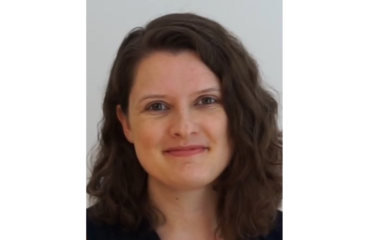
Barbara van der Linden
Staff member Implementation and Innovation at ZonMw, The Netherlands
Steering committee member of the Dutch national Implementation Network (NIC)
Board member of the European Implementation Collaborative (EIC)
Twitter: @blinde01
E-Mail: [email protected]
In March 2022, the health research funders that are united in the Ensuring Value in Research Funders Forum published an article that described funders’ activities in the areas of Dissemination & Implementation (D&I) of research results. The results show activities in six categories.

Most funders allow for, stimulate and sometimes require researchers to carry out D&I activities, such as Open Access publishing or implementation follow-up projects after successful results. A growing number of funders is going beyond this and carry out D&I activities themselves, supported through various strategies. Next to release of findings on funders websites or project databases, funders actively disseminate results to users through (funders, partners and organisational) channels. Funders organise exchange and partnerships between researchers and health care practitioners and are actively involved in building capacity and expertise for implementation, currently most often done by supporting training for implementation scientists and practitioners.
Another exciting new way that funders can help build implementation capacity is to support the creation and development of national or regional implementation networks. As European Implementation Collaborative (EIC) board member and steering committee member of the Dutch national Implementation Network (called NIC), I want to share some news from the NIC and how ZonMw, the Dutch government health research funder, has stepped up to help the NIC develop into a strong and well organised network. To my knowledge, ZonMw is the first funder that is undertaking this role in an explicit and planned fashion albeit as a temporary kick-start strategy. We are two years in now and hope to create an independent and self-supporting network in the coming two years.
How everything started
The Dutch NIC has been an informal network of implementation-minded scientists and practitioners since 2014. First it was not much more than a mailing list of about 200-300 names of individuals interested in implementation. Activity in the first few years consisted of exchange of invitations to implementation focused meetings but also an annual Implementation Week where implementation activities (including an international symposium) were organised by different institutions in the same week and promoted through one central website.
Discussions between members of the NIC started to focus on the phenomenon of implementation professionals and the desire for developing implementation research and practice into a (more) recognized profession. The initiative to organise a first European Implementation Event (EIE) brought individuals from ZonMw, the University of Amsterdam, the Dutch Institute of Mental Health and Addiction Trimbos, The Quality Institute for Medical Specialists, the Ministry of Health, Welfare and Sport, and the Dutch Centre for Youth Care together. Their collaboration also led to the production of a position paper in November 2019 titled Implementation: a new profession, a recognized field in The Netherlands (in Dutch).
The position paper outlined the reasons for strengthening NIC: a growing number of implementation practitioners and scientists who are involved in implementation projects and research grants, the need for exchange of implementation knowledge and tools and the need for education in implementation but also lack of recognized competencies and educational and research programmes. The paper concluded with a call to the Dutch Ministry for funding for this initiative.
The Ministry agreed to fund a consultation project to determine views on and commitment to NIC amongst stakeholders like university departments and knowledge institutes. Part of this consultation project was a survey amongst other European implementation networks (8 networks across Europe) on their organisational structure and activities. Finally, a survey was held amongst the NIC mailing list members to determine their wishes and needs regarding participation in and development of the network. The consultation report was presented to the ministry in January 2021. It confirmed the need and feasibility for a formally structured NIC especially because the survey showed a great willingness from respondents to become actively involved in this work. ZonMw agreed to take a leading role in coordinating and organising the new NIC. A new and exciting role for a research funder to take up.
What has happened since then?
Currently, NIC has a coordinator (0,3 FTE) and communications and secretarial support, albeit limited in size, posted at ZonMw. NIC has 4 working groups on implementation research, implementation tools, competencies/education and intervision/networking. The working group leaders and the coordinator form the NIC steering committee. An implementation research agenda has been created (capturing members priorities), a competency list for implementation scientists has been produced and another such list for implementation practitioners is under development. The NIC website has been redesigned and newsletters are published regularly. The ‘tools’ working group is working on creating a platform for posting and curating implementation frameworks and formats. We continue to hold webinars and the annual Implementation Week in the Netherlands. (And, of course, we co-hosted the EIE2021!)
What’s next?
NIC aims to move forward towards an official society which is financially self-supporting by membership fees and/or institutional support. We foresee roles in accrediting educational programmes, registry of NIC accredited implementation professionals, maintaining a go-to resource for implementation tools and in supporting implementation research agenda setting. But perhaps the most important of all is that NIC wants to bring implementation professionals together and connect implementation and health care practice. With the overall aim to improve the implementation of effective interventions using evidence generated in implementation science and practice, to ensure best patient care.
The role that ZonMw as a research funder plays in facilitating this important work has been crucial and hopefully can be seen as an example for other funders worldwide.
We are happy to share our experiences so feel free to connect with me if you want to hear more!
Sign up for NIC’s newsletter, follow the Dutch Implementation Collective on Twitter or join their LinkedIn Group. More infos on the NIC Website.


